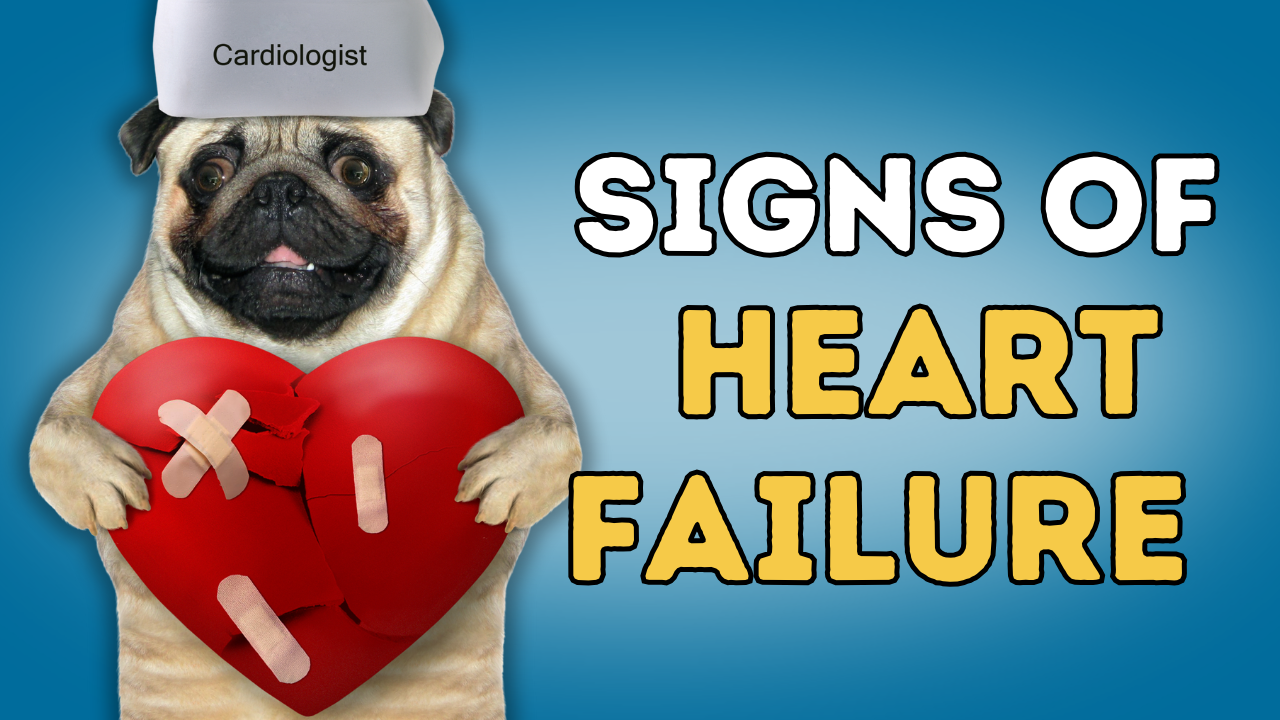5 Common Signs of Heart Failure in Dogs

Heart disease seems to be increasingly diagnosed in our dogs, but is there anything that youcan do to help prevent it?
Omega 3 Fatty Acids are one of the few supplements documented to help heart disease… for dogs, cats and people.
If you have a dog with a heart, then you may want to consider my supplement, Dr. Jones’ Ultimate Omega 3 for Dogs and Cats


5 Common Signs of Heart Failure in Dogs
As a veterinarian with years of experience, I’ve observed that heart disease is a prevalent issue in dogs, similar to humans. It can stem from various conditions such as heart valve degeneration, arrhythmias, and heart muscle disease. Despite the diverse types of heart conditions, there are common signs that you, as a pet owner, can watch for to detect issues early.
Common Symptoms of Heart Disease in Dogs
-
Persistent Cough Dogs affected by heart disease often develop a cough that lingers more than a few days. This cough arises for several reasons. Primarily, it could be due to fluid accumulation in the lungs caused by the heart’s inefficiency in pumping blood. This situation leads to blood “backing up" into the lungs, causing fluid leakage into lung tissues. Additionally, heart enlargement from some diseases can press against airways, prompting coughing. If your dog has a persistent cough, it’s advisable to consult your veterinarian.
-
Fainting or Collapse A decrease in heart function can reduce the supply of vital nutrients, especially oxygen, to organs like the brain. This insufficiency might lead to fainting or collapse, often triggered by physical activity or even by severe coughing episodes.
-
Breathing Difficulties Dogs with heart issues might exhibit signs of struggling to breathe. They may breathe more rapidly or forcefully, often assuming a posture with their legs spread apart and neck stretched out, particularly when severe heart disease is present.
-
Fatigue and Reduced Exercise Tolerance You might notice your dog tiring more quickly than usual during walks or playtime. They may also seem to sleep or rest more frequently.
-
Behavioral Changes Look out for changes such as decreased appetite, withdrawal, or a reluctance to engage in previously enjoyed activities. These could all be indicators of heart disease.
Diagnostic Tools for Heart Disease
- Chest X-ray: Essential for assessing heart size and detecting fluid buildup in the lungs.
- Electrocardiogram (ECG): This is crucial for identifying arrhythmias. Sometimes, a prolonged monitoring via a Holter monitor might be necessary to detect irregular heartbeats over several days.
- Echocardiogram: This ultrasound of the heart has been revolutionary in diagnosing heart conditions, providing valuable information about the disease and helping to tailor treatment strategies.

Treatment and Management of Heart Disease
Heart disease, while serious, can be managed with various treatments that not only control symptoms but also improve quality of life. These include dietary modifications, activity adjustments, and a range of therapeutic options. It’s important to work closely with your veterinarian to determine the best approach for your dog.
Integrating Natural Remedies
Consider incorporating natural remedies such as:
- Dandelion: This herb acts as a safe diuretic and is also rich in potassium, which is beneficial since many diuretics can deplete potassium levels.
- Hawthorn: Known for improving heart contractions and dilating blood vessels, easing the heart’s workload.
- Coenzyme Q: This antioxidant has been shown to reduce heart muscle damage in humans.
- Omega-3 Fatty Acids (Krill Oil): These are effective in strengthening the heart, reducing arrhythmias, and lowering the risk of blood clots.
Omega-3 Supplements
In conclusion, while managing heart disease in dogs can be challenging, incorporating supplements like krill oil, which is rich in omega-3 fatty acids and the antioxidant astaxanthin, can significantly benefit your dog’s heart health. Always consult with your veterinarian before starting any new supplement to ensure it’s safe and appropriate for your dog’s specific health needs.

Thank you for this information. She also has backed up fluid in her chest and stomach. Is there anything I can give her naturally that can help her push all that fluid out ? Thanks you
You are very welcome. I wish there was a truly safe natural diuretic that worked like the prescription ones but there really is not. When fluid is in the chest or belly that usually means the heart needs medical help to move that fluid out safely.
From a natural support side, Dr. Jones focuses on low sodium food, omega three fish oil, taurine, CoQ10, and hawthorn to support heart function. Those can help long term but they will not pull fluid out on their own.
The good news is many dogs feel much better once the fluid is controlled.
Hello! I just wanted to ask what would be helpful for my mixed poodle that has heart failure and fluid in her stomach and chest. Is there anything I can give her that’s natural for dogs?
With heart failure and fluid buildup the big priorities are comfort and supporting the heart while working with your vet. From a natural side, Dr. Jones often use omega three fish oil, taurine, CoQ10, and gentle antioxidants like hawthorn which is a classic heart herb he talks about in the blog. Low sodium food is also very important.
That said fluid in the chest or belly usually means she still needs prescription meds to stay comfortable. The natural options work best alongside those, not instead of them.